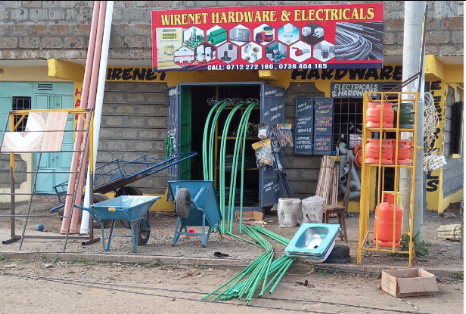How To Start A Hardware Business In Nairobi Kenya
Are you looking for a guide on how to start a hardware business in Nairobi Kenya? We will help you have a better understanding and courage to get started by the end of this article.
A hardware business that is well-managed has the potential to generate significant profits.

Establishing a prosperous hardware business in Kenya is achievable with the growing construction industry.
Although it may pose some difficulties, obtaining the right knowledge can lead to success.
To thrive in this business, it is crucial to understand the intricacies of the hardware industry and distinguish yourself from competitors.
Starting a hardware business requires thorough market research and a well-crafted business plan to enhance the chances of success, just like any other business venture.
To increase your likelihood of success, you must consider crucial factors such as capital requirements, business location, target customers, product suppliers, and the necessary business licenses.
If you’re interested in starting a hardware business in Kenya, here’s what you need to know, including the estimated costs to set up a small hardware store in the country.
#1. Do Market research
It is highly crucial to understand the market segmentation prior to initiating a business.
This knowledge can equip you to tackle obstacles that may arise in the market. Additionally, it helps you to determine the market needs and how to meet them effectively.
By conducting thorough market research, you can identify the trending products that are in high demand to stock up on.

You can also seamlessly blend in with the current market trends. This research will also enable you to determine the initial capital required for a hardware business.
#2. Write a Hardware Business Plan
As you start a hardware business in Nairobi Kenya, a key step is crafting a business plan that sets the direction for your venture.
This plan should include a clear mission statement and a marketing strategy tailored to your community.
To ensure your business is financially sustainable, you’ll also need to develop a budget that takes into account the size of your physical location and the inventory you plan to stock.
A detailed layout of your hardware store is essential in creating an accurate budget.
A comprehensive business plan should include the following information:
1. Start-up capital required for the hardware business.
2. Recommendations regarding the hardware products to stock.
3. Ideal business location(s) for the venture.
4. An analysis of the strengths, weaknesses, and business risks associated with the enterprise.
5. Strategies for countering the competition in the market.
In addition, it’s important to create a marketing plan that aligns with your business goals and a budget that accounts for startup costs, expenses, and projected revenues.
With a strong plan, you’ll be well-equipped to navigate the challenges of starting and running a successful hardware business.
#3. Formalize Your business
To initiate a hardware business in Kenya, the most suitable method is to register it either as a sole proprietorship or a limited liability company.
This will simplify the process of opening business accounts and creating favorable credit relationships with hardware distributors whenever feasible.
It is essential to select a distinctive name that will help your store stand out from other similar establishments.

Moreover, registering with the Kenya Revenue Authority is necessary for tax-payment reasons.
Registration for Value Added Tax (VAT) may also be required, which will need you to get hold of an Electronic Tax Register (ETR) to make your transactions more formal.
#4. Secure The Necessary Hardware Business Permits
To start a hardware business in Nairobi Kenya, it’s essential to secure all the essential permits.
In order to operate, you’ll require a sole business license which you can acquire from the local authorities within your vicinity. The expenses for obtaining these permits may differ depending on the county you’re in.
Additionally, you’ll need to get hold of a fire certificate license from your specific county.
Related: How To Start a Butchery Business in Nairobi Kenya
#5. Finance Your Business
As you embark on your journey as an entrepreneur, whether as a sole proprietor or a limited liability company, it’s crucial to assess your budget and funding sources.
If finances are tight, exploring options such as a small business loan from a bank, seeking support from family and friends, or connecting with a local angel investor could be beneficial.
#6. Identify Hardware Item Suppliers Near You.
To maintain a high-profit margin, it is important to secure dependable and cost-effective suppliers.
Many suppliers offer transportation services for businesses, so it is advisable to find one that can cater to your specific requirements.
Additionally, it is crucial to verify the reliability of your suppliers and their ability to consistently deliver hardware items on schedule.
#7. Stock your hardware
After securing your startup capital, the next crucial step in starting a small hardware business in Kenya is to ensure that your inventory is stocked with products that have high turnover rates.

Typically, the most profitable products to start a hardware business in Nairobi Kenya with include
- Cement
- Nails
- Steel bars
- Pipes
- Roofing sheets
- Gutters
- Binding wire
- Tiles
However, it’s worth noting that the amount of capital required will largely depend on the size and location of your business.
Prices of hardware goods tend to be cheaper in Nairobi than in far-flung areas like Kisumu due to transportation costs.
Here’s a detailed cost breakdown for the project:
Rental fee and deposit – Sh60,000
Business permit – Sh10,000
Cement – Sh300,000
Steel bars – Sh200,000
Pipes – Sh120,000
Roofing sheets – Sh250,000
Tiles – Sh150,000
Additional expenses – Sh150,000
Overall budget – Sh1,240,000
That being said, it’s important to factor in the cost of rent which is notably higher in Nairobi compared to upcountry locations.
Also Read: How To Start A Kitchen Utensils Business In Kenya
#8. Market your business
Begin by establishing your own unique brand by incorporating your name and logo into your hardware store.

This will distinguish you from your competitors and make your business easily recognizable. Another effective strategy is to launch a website and social media accounts to promote your products and services to potential customers.
Additionally, investing in targeted advertising can help increase the visibility of your brand.
It’s crucial to keep track of your marketing efforts and determine which channels are most effective for your business. Continuously monitor and assess your results to optimize your marketing strategy.
#9. How to Win the Competition
The hardware business in Kenya has proven to be a lucrative venture, as evident from the rising number of hardware businesses being established every day.

To stay ahead of the competition, it is crucial to consider the following tips:
1. Offer low and fair prices for your customers, and provide discounts for bulk purchases. This will attract more customers and encourage them to keep coming back.
2. Ensure that you have all the necessary products that your clients need. Having a one-stop shop minimizes the chances of customers looking elsewhere for what they need.
3. Avail of different modes of payment, including card payments and money transfer services like M-pesa. This will make it more convenient for customers, especially for bulk purchases where cash payments may be avoided.
Is The Hardware Business Profitable in Kenya?
Typically, the hardware business can be quite profitable with a solid customer base.
The standard profit margin for this industry is around 10 percent per sale. For instance, if you manage to sell Ksh 50,000 worth of hardware every day, your profits would amount to Ksh 5,000.
Yet, it’s worth noting that your overall profits will depend on the profit margin you establish.
How to Run a Hardware Business Effectively in Kenya
As a business owner, it is crucial to maintain accurate records of both sales and purchases.
This allows you to track your profits and identify which products are selling quickly. Additionally, having a solid understanding of hardware is essential.
Familiarizing yourself with your inventory will enable you to provide customers with expert advice on the best products and how to use them effectively.
Final Thoughts on How to Start a Hardware Business in Kenya
This guide equips you with the necessary knowledge to successfully establish and manage a lucrative hardware business in Kenya.
Hardware businesses in Kenya are highly profitable due to the increasing demand for construction supplies as more and more Kenyans undertake building projects.
To maximize profit, it is advisable to source affordable suppliers, which in turn will result in a larger profit margin.






